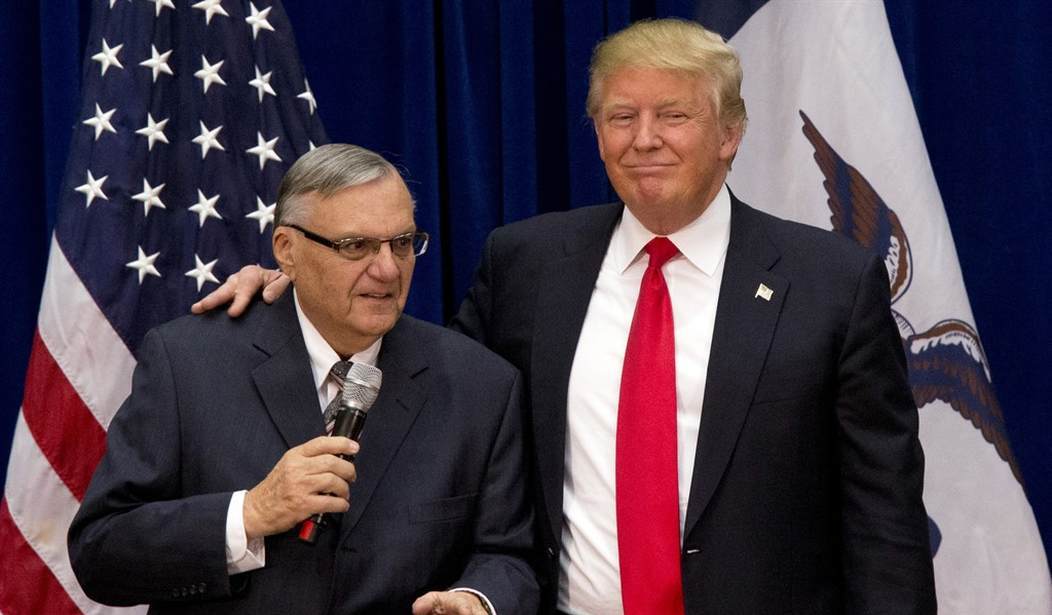He ran as a “law and order” president. Issuing a get-out-of-jail free card by royal decree to someone who violated a judge’s order for months on end doesn’t feel so “law and order”-ish.
However you feel about Trump already, this will intensify those feelings. Fans will cheer it as a show of loyalty towards an ardent border hawk and campaign booster, as well as a hearty “f*** you” to the media that despises Arpaio. Lefty critics who hate Arpaio for his eagerness to crack down on illegals will jeer Trump for showing him mercy and accuse him of using this pardon as a sop to the alt-righters whom he antagonized in this morning’s press conference.
My preferred hot take is that Trump knows he’s going to fire Bannon soon and wants to signal to righty populists that he’s still one of them, even if Bannon ends up being punted out of the White House. This would help.
“I am seriously considering a pardon for Sheriff Arpaio,” the president said Sunday, during a conversation with Fox News at his club in Bedminster, N.J. “He has done a lot in the fight against illegal immigration. He’s a great American patriot and I hate to see what has happened to him.”…
Arpaio’s widely publicized tactics included forcing inmates to wear pink underwear and housing them in desert tent camps where temperatures often climbed well past 100 degrees Fahrenheit. He also controversially brought back chain [gangs], including a voluntary chain gang for women prisoners…
“Is there anyone in local law enforcement who has done more to crack down on illegal immigration than Sheriff Joe?” asked Trump. “He has protected people from crimes and saved lives. He doesn’t deserve to be treated this way.”…
Trump indicated he may move quickly should he decide to issue a presidential pardon. “I might do it right away, maybe early this week. I am seriously thinking about it.”
Background on the contempt charge pending against Arpaio: As sheriff, his deputies would stop drivers to check their legal status; in 2011 a federal judge ordered him and his force to stop doing that for fear that Latinos, including U.S. citizens and legal residents, were being racially profiled. Arpaio continued to carry out the operations for another 18 months but claimed that he didn’t violate the order intentionally. Rather, he said, it was unclear in what it was asking of him. Last year another federal judge found him in contempt for violating the original order. He’s awaiting sentence now and could face up to six months in prison, but he’s appealing the ruling. Even if his appeal’s denied, he’s old enough that he may not serve any time. Trump could wait, in other words, and see how all of this shakes out in case a pardon isn’t needed to spare him any jail time. But a good political opportunity is a good political opportunity. A preemptive pardon would short-circuit the contempt proceedings immediately.
Incidentally, when was the last time we had a high-profile presidential pardon or proposed pardon that wasn’t bitterly divisive? Pardons do sometimes issue in routine cases where the sentences seem disproportionate to the offense, but presidents tend to hold off on those until well into their lame-duck periods and they usually come packaged with more dubious pardons for political cause celebres. Chelsea Manning was a notorious example from the closing days of Obama’s presidency; Bill Clinton’s Marc Rich pardon remains notorious nearly 20 years later. Arpaio would be small potatoes compared to those but still an obvious example of a pardon being used as a political pander. Assuming Russiagate heats up to the point where Trump starts to worry that his inner circle is in legal jeopardy, he may take the next step and start pardoning family members to spare them from criminal consequences. If and when the righties who want a constitutional convention of the states ever manage to pull it off, it’d be worth revisiting the presidential pardon power. It’s a vestige of monarchy that might be used more responsibly if it had some sort of congressional oversight, like a requirement that both houses of Congress ratify a pardon proposed by the president.








Join the conversation as a VIP Member